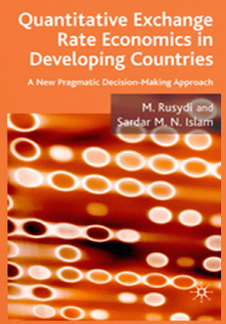🎁 Exclusive Discount Just for You!
Today only: Get 30% OFF this course. Use code MYDEAL30 at checkout. Don’t miss out!
Financial development can mean some improvements in Information about potential investments, allocating capital, monitoring companies and exercising corporate governance
M.Rusydi – Quantitatice Exchange Rate Economics in Developing Countries
Description
This book examines the various options available for determining an appropriate exchange rate regime and its associated rules for developing countries. It includes a case study on Indonesia. It discusses exchange rate issues and provides market analysis.-Base, equilibrium, shadow-Pricing exchange rate models in developing countries is possible by considering all three types of models and choosing the appropriate exchange rate regime. This book demonstrates that there is a credible policy and exchange rate regime, which can reduce uncertainty. in The exchange market can mitigate currency flight from broad money and ensure stability and certainty especially for private sectors. in A measure of export competability. A set of market-Tested and developed are equilibrium and based exchange rate models.
Review
‘This book makes a huge impact on our understanding of the exchange rate determination in developing countries. I strongly recommend you to read this book.’ Professor Dr. Syahril Sabirin (ex-Governor of Bank Indonesia, Indonesian Central Bank),
‘This book gives a very high quality and significant contribution to the research in exchange rate determination and financial economics in general. This is a book that must be read.’ – Professor Dr Datuk Mashkuri Yaacob, Vice Chancellor, Tenaga National University, Malaysia M.Rusydi – Quantitatice Exchange Rate Economics in Developing Countries
‘This book develops a unified approach to the analysis of exchange rate determination in developing countries. Its quantitative approach is very sophisticated and relevant to the application of the finance software.’ – Ichad Irsyad (Microsoft, Seattle)
‘I find this book a valuable contribution to the literature in international finance. It is very useful to researchers, academics, practitioners, policy makers, and postgraduate students.’ – Nevi Danila PhD, PresidentMalangkucecwara School of Economics, Malang
Download now M.Rusydi – Quantitatice Exchange Rate Economics in Developing Countries
About the Author
RUSYDI can be described as a Practitioner in Markets for Shares and Derivatives He is also a lecturer in Finance and Financial Planning at Deakin University in Australia. He was also a member of the Financial Modelling Program, Centre of Strategic Economics Research, Victoria University, Australia. He has presented many papers at international conferences. His experience is extensive. in Retail and oil sectors in The Asia Pacific region.
SARDAR M.N. SARDAR M.N. is Professor of Welfare and Environmental. Economics Director of the Sustainable Growth Program, Centre for Strategic Studies, Victoria University. His research interests and areas of teaching are in Economic concepts include welfare economics (computerized economic modelling), development and growth economics (environmental and resource economics) and health economics. He has published extensively.
Financial Development Course
Financial development can mean some improvements in Information about potential investments, allocating capital, monitoring companies, exercising corporate governance, trading and diversification, management of risk, mobilization of savings, management of risks, managing the exchange of goods or services, and facilitation of corporate governance.
Course Features
- Lectures 0
- Quizzes 0
- Duration Lifetime access
- Skill level All levels
- Students 0
- Assessments Yes

